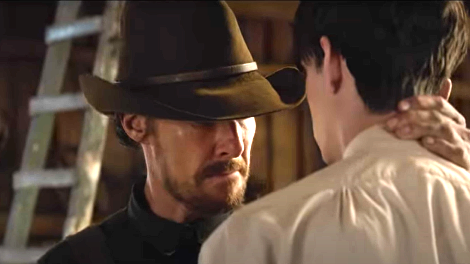 Jane Campion’s first film in twelve years examines deceptive notions of manhood on a cattle ranch in 1920s Montana.
Jane Campion’s first film in twelve years examines deceptive notions of manhood on a cattle ranch in 1920s Montana.
New Zealand filmmaker Jane Campion was a big part of the cinematic breakthrough of her home country, and Australia, in the 1980s and ‘90s. She’s still best known for 1993’s The Piano, but her subsequent work has maintained her reputation for excellence. However, she hadn’t made a theatrical feature in 12 years until now, with her acclaimed new film called The Power of the Dog.
Adapted by Campion from a 1967 novel by the American writer Thomas Savage, The Power of the Dog takes place in Montana in 1925. Two brothers, Phil and George Burbank, have been given this land in southwest Montana by their elderly parents, but their mentor and idol was a wild character named Bronco Henry, to whose memory Phil is particularly devoted. Bronco Henry introduced them to the cowboy life. Phil, played by Benedict Cumberbatch, is a hard-working ranch boss, whose toughness, charisma and authoritative manner commands respect from the hands working there. Jesse Plemons plays the younger brother, George, whose talents are more financial: managing the payroll, working with the banks, and so forth. From the beginning we see that Phil bullies his brother, calls him “fatso” and “dumb,” treatment to which George is evidently accustomed, and which he usually brushes off without taking the bait. Without a doubt, they’re used to each other. They even share the same bed.
Trouble begins, as we know it must, when George takes an interest in Rose Gordon, played by Kirsten Dunst. Rose is a widow struggling to keep the local inn and eatery running. Phil doesn’t like George having outside interests; he doesn’t like Rose; and he feels particular contempt for Rose’s 20-year-old son Peter, a thin effeminate intellectual type who is ruthlessly mocked by all the hands, and is played by Kodi Smit-McPhee.
I’ve seen Cumberbatch play a villain before, notably in one of the Star Trek movies, but this is different. Campion never glamorizes “bad guys” or invests them with mystery. Benedict Cumberbatch’s portrayal of Phil Burbank is brilliant because Phil’s meanness is so ordinary. A real bully is hiding fear, and we can feel it in this character even when he seems the most tough.
Campion also has the discipline to not try too hard. The deceptively simple story is presented without bombast or even much emphasis beyond Jonny Greenwood’s menacing score, which admittedly is quite dominating. Instead of tricking everything up with dramatic emphasis, Campion lets the story speak for itself, and we learn more about these characters than we may have expected. To reveal more would be a spoiler, but let’s just say that when the movie was over, I could finally notice the clues and tie them together, and thereby notice my own mistaken assumptions about what is going on.
The entire film was shot in New Zealand, but it looked like Montana to me. And there are dogs in the film, but the meaning of the title, The Power of the Dog, actually comes from Psalm 22 in the Bible. You’ll have to see for yourself what that means. Jane Campion’s intriguing western parable has a stinger at the end of its tail.

Christopher Nolan dramatizes the spectacular escape of British troops from Dunkirk in 1940, in a film that emphasizes the brutality and terror of war....

A teacher at a rural middle school in Turkey is unjustly accused of impropriety by a girl student, but this crisis confronts him with...

In the early 1970s, at the peak of her powers and her success, Aretha Franklin decided that she wanted to make a gospel album,...